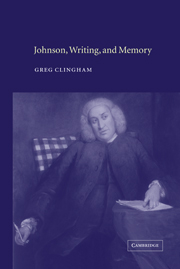Book contents
- Frontmatter
- Contents
- Acknowledgments
- List of abbreviations
- Introduction: Johnson and authority
- 1 Johnson and memory
- 2 Johnson and nature
- 3 Law, narrative, and memory
- 4 Narrative, history, and memory in the Lives of the Poets
- 5 Translation and memory in the Lives of the Poets
- 6 Historiographical implications
- Notes
- Bibliography
- Index
Introduction: Johnson and authority
Published online by Cambridge University Press: 22 September 2009
- Frontmatter
- Contents
- Acknowledgments
- List of abbreviations
- Introduction: Johnson and authority
- 1 Johnson and memory
- 2 Johnson and nature
- 3 Law, narrative, and memory
- 4 Narrative, history, and memory in the Lives of the Poets
- 5 Translation and memory in the Lives of the Poets
- 6 Historiographical implications
- Notes
- Bibliography
- Index
Summary
The question of authority is a subject of almost all criticism devoted to the life and writing of Samuel Johnson. This book attempts to identify a specific kind of Johnsonian authority arising from a structure of memory governing most if not all of Johnson's writing, most clearly exemplified in the Lives of the Poets. In biography, authority and memory are functions of Johnson's narrative, especially in the various ways in which his engagement of the lives and writings of specific writers enables his reflection on history, literary history, and time. Within a complex nexus of different moral, political, linguistic, and historical discourses, the Lives, I will argue, constitutes (in the words of Pierre Nora) les lieux de mémoire, a sophisticated attitude toward time and historiography that newly contextualizes Johnson within eighteenth-century and modern discourses about fiction and history.
William Hamilton's much-quoted words on the death of Johnson – “He has made a chasm, which not only nothing can fill up, but which nothing has a tendency to fill up” – is only one of the earliest expressions of the kind of unique and natural power that Johnson represented for his contemporaries, that commentators have grappled with ever since. This power was invariably seen as intellectual and moral.
- Type
- Chapter
- Information
- Johnson, Writing, and Memory , pp. 1 - 13Publisher: Cambridge University PressPrint publication year: 2002



